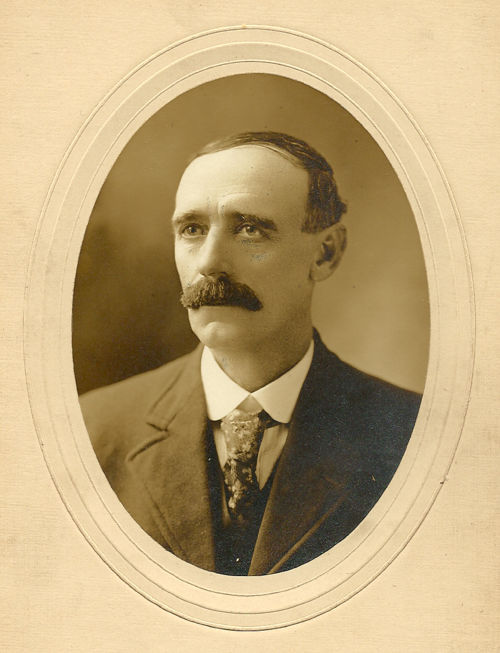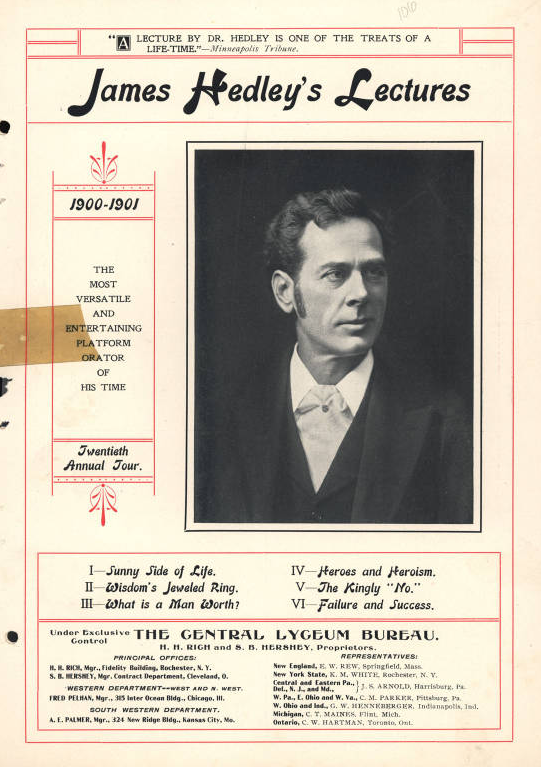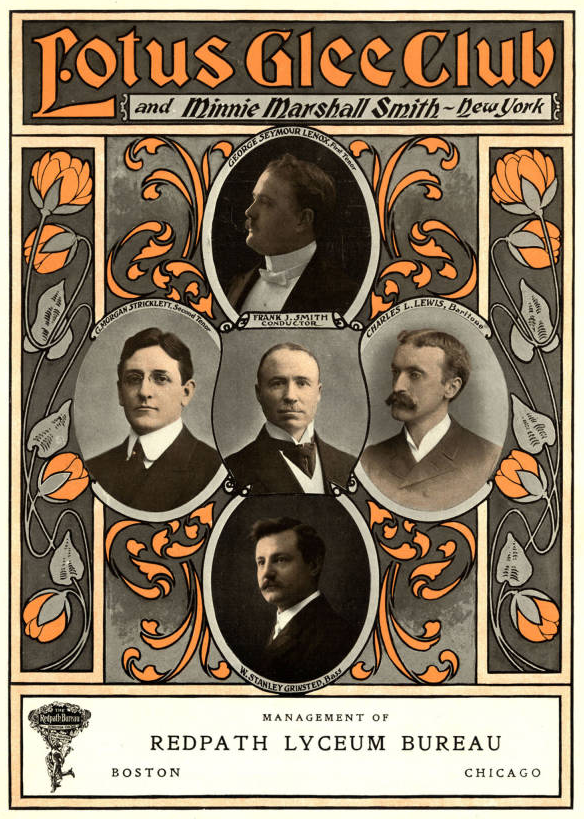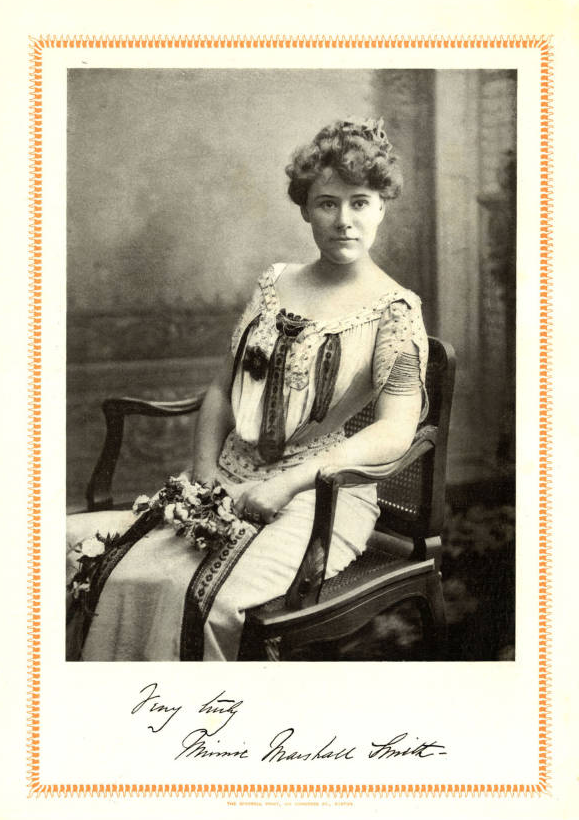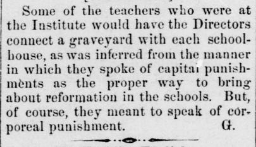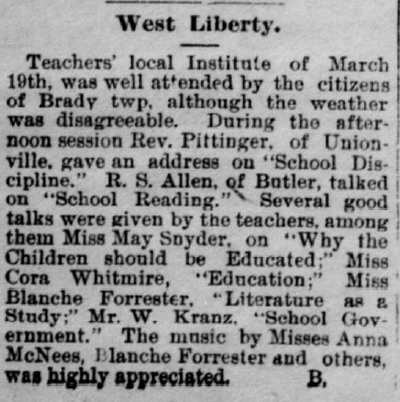
PREFACE: Both of my parents are from Butler, PA. My grandmother was Edith (Whitmire) McClain (1917-2003), and I have childhood memories of attending Whitmire family reunions in Alameda Park in Butler, PA.
I possess a genealogical record full of names and dates concerning the Whitmire’s of Butler, PA, compiled over the years by family members. I’ve been toying with the idea of using that record and writing a family history. I am interesting in capturing the stories of the lives of the Whitmires. I’m very much an amateur genealogist and historian, so part of the purpose of this blog post is to document my experience of researching my ancestry, another part is to share what I know/don’t know, with the hope that readers could help fill in the blanks.
So, let us start at the head: The patriarch of the Whitmire’s of Butler, PA is Francis Whitmire, Sr. (d. 1832). What is known about this man? What is his ancestry and who are his descendants? I only have partial answers. This post will focus on immediate descendants.

The 1883 History of Butler County provides the following biographical sketch in the chapter about the history of Oakland township (chapter 34):
Among the earliest settlers of this township were Francis WHITMIRE and Connell O’DONNELL. The former came from Berks County in 1798, with his wife and family, and settled on a tract of land in the neighborhood of Boydstown, which he purchased of Stephen LOWRY. Dying in 1832, he left his farm, in a good state of cultivation, to his children. His wife’s name was Catherine RUST. She was the mother of nine children, none of whom are now living except John, who is now living with his son Peter, in the northwestern portion of the township on a magnificent farm, upon which an elegant frame house and barn were erected, the former in 1878 and the latter in 1880. (pg 323)
From this statement, we learn several key facts concerning Francis (all of which require verification):
- Francis arrived in the region eventually known as Boydstown, Oakland Township, Butler County in 1798 (Butler County was formed in 1800 from parts of neighboring counties).
- Francis purchased land from a man named Stephen Lowry.
- Francis’s spouse is named Catharine RUST.
- At his time of arrival (1798), Francis and Catharine were married and had children.
- Francis and Catharine were parents of nine children.
- Eight of the nine offspring of Francis and Catherine died prior to 1883.
- One child of Francis and Catherine is named John. He is still alive in 1883, residing on the well-developed farm of his son, Peter.
- Francis died in 1832 and left his farm to his children.
The 1883 History also provides some biographical information about John Whitmire, listing his children. I’ll discuss that information at a different time. As an aside: I am a descendant of John Whitmire, the last surviving child of Francis Whitmire, Sr.
The 1895 History of Butler Co. repeats much of 1883 History. However, the 1895 history provides some additional detail about some of Francis and Catharine’s other children:
FRANCIS WHITMIRE, SR., came from Berks county to Butler county in 1798, accompanied by his wife and family, and settled on a tract of land near the site of Boydstown, Oakland township, which he purchased of Stephen LOWREY. His wife’s maiden name was Catherine RUST, and they were the parents of nine children, all of whom are dead. Among them were Daniel; John; Francis; Julia, and Catherine. Daniel served in the War of 1812, and died on March 21, 1867, in the seventy-sixth year of his age. His wife Susan died May 14, 1861, in her sixty-ninth year. Mr. and Mrs. WHITMIRE spent the remaining years of their lives upon the homestead, where he died in 1832.
The 1895 History has biographical sketches of son’s John and Francis, Jr, calling them respectively, second and third sons. These sketches include their birth and death dates. In addition, the 1895 History include a biographical sketch of a man named Jacob Fleeger, and lists his spouse as Catherine Whitmire, a “native of Berks Co” who died in 1863 and who was the mother of 17 children. So, additional facts now known:
- First son Daniel (~1791 – 1867), War of 1812 veteran. Spouse’s name is Susanna
- Daughter Catherine (assumed before 1798 – 1863), married Jacob Fleeger
- Second son John, Sr. (1805-1891), married Catherine Painter
- Third son Francis, Jr. (1809-1880), married Susanna Osembauch, married Anna Painter
- Daughter Julia (? – before 1883)
Last Will and Testament
I have images of Francis Whitmire Sr.’s Last Will and Testament, dated May 19th, 1832. What follows is my best attempt at a transcript. I have attempted to preserve the original spelling and line breaks.
(click on images below for high resolution view)
-------------------------------------------------------------------------
I Francis Whitmire of the Township of Centre and Cou
nty of Butler for once do make and publish this my last will
and testament hereby Revoking and making void all for
mer wills by me at any time hertofore made. And first
I direct that my body be decently Intoned in the burying ground
and that my funeral be conducted in a manner corre-
sponding with my Estate and station in Life: And
as to such worldly Estate as it hath pleased God to entrust
me with I dispose of the same as follows First I direct
that all my Debts and funeral Expenses be paid - and
I do bequeth unto my son John one hundred and fifty
acres of the tract of land I now live on to be taken out of the
East Corners of said tract adjoining Lands of Michel
Thomson the East and the Heirs of John Thompson
dec’d on the north and the remaining part of said
tract on the south and west. and to my son Francis
I do bequeth the remaining two Hundred and fifty acres
of Land that I now reside upon with all the apertain
ences[?], thereunto belonging. and I do direct and it is
my will that my son John do pay in trade fifty
dollars to my son Daniel and Twenty five dollars
to my daughter Peggy within four years after my
decease. And it my will that my son Francis do
pay to my Daughters Sarah and Peggy Fifty dollars to
Sara and Twenty five dollars to Peggy in trade to be
paid in four years after my decease. And I do further
bequeth unto my Daughters Catherine now Entermarried wi
th Jacob Fleger and [?] now Entermarried with Daniel
Sherit, and Elizabeth now Entermarried with Fredrick
Sarens and Polly now Entermarried with Andrew Ma
ise two Hundred and fifty acres of Land lying and
situate in Muddy Creek Township Butler County in
the first Donation[?] District to be Divided Equaly
amongst the last four named of these my daughters
--------------------------------------------------
And I do bequeth unto my son Francis five head
of Horses and one Cow, and four head of Sheep and
sixteen head of Hogs or Swine and one wind mill and
Plow and harrow and horse gear[?] and one mare sa-
dle. And I do further bequeth unto my daughter Peggy
two beds and beding and all my kitchen furniture
and one spinning wheel and one cow and calf and four
head of sheep, and I do bequeth unto my Heir
Goredy Premire two beds and Beding and one spin-
ing wheel and one cow and calf and four head
of sheep, and I do further direct and it is my will
that all Bonds and Notes due to me shall remai
in the hand of my son Francis until the are collect
and after my Debts and funeral expenses is Discharg
ed all that remains of said Money I allow to be
applyed to the pattenting[?] of the Land now in
the occupancy of my self and John Whitmire
In witness whereof I Francis Whitmire the Testator
have to this my will written on one half sheet of paper
set my hand and seal this nineteenth day of May in
the year of our Lord one thousand Eight Hundred
and thirty two 1832
his
Francis X Whitmire {x}
Mark
Signed sealed and Delivered
in presence of us who have
Inscribed in the presence of Each other
Witness present
Andrew Christy
Irving Bainmores
----------------------------------------------------------------
From Francis Whitmire, Sr’s Will, we have confirmed and we learn:
- son Daniel (~1791 – 1867), married Susanna —–
- daughter Catherine (Whitmire) Fleeger (assumed before 1798 – 1863)
- son John, Sr. (1805-1891), married Catherine Painter
- son Francis, Jr. (1809-1880), married Susanna Osembauch, married Anna Painter
- daughter Sarah (? – ?), living as of 1832, presumably unmarried
- daughter Peggy (? – ?), living as of 1832, presumably unmarried,
(also presumed to be properly called Margaret because an other document as part of the Will court records citing a “Margaret Whitmire”) - daughter (presumably Julia) (?-?) who married Daniel Sherit
- daughter Elizabeth (?-?), living as of 1832, who married Frederick Sarens
- daughter Polly (?-?), living as of 1832, who married Andrew Maise
In addition, the absence of any mention or provision by Francis for wife Catherine leads one to suspect that she died prior to 1832.
I have some additional resources which help to fill in the above blanks, a little.
St John’s (Hain’s) Reformed Church, Berks Co.
First, it has been proposed that Francis Whitmire is the son of Eberhardt Weydenmeyer, a German immigrant who lived in Berks county after his arrival in 1764. There are several good reasons to believe this is true. They were in the same place at the same time, and there is common variations of spelling of their names. Eberhardt Weydenmeyer’s name is spelled in various ways in documents dated between 1764 and 1794, when it is believed he died. These variations include (but are not limited to): Weidenmeyer, Witmeyer, Whitmoyer, and Whitmyer. Variation and ultimately change in name was a common experience for German immigrants to a English speaking colonies, and is well documented. Spelling of the name transitions to more closely match the English phonetic sounds. There is some evidence of variation in the spelling of Francis and Catharine’s last name in documents from Butler, where it is spelled Whitmyre.
Taking into account what we know of Francis and Catharine’s family, and understanding variation in spelling of German immigrant names makes all the more credible the claims that records of St. John’s (Hain’s) Reformed church in Lower Heidelberg Township, Berks County from the 1780s and 1790s are those of Francis and Catherine and their children. According to this church’s baptismal records: (pg 123-124)
- 1788, Dec 7. Catharine Elizabeth, daughter of Francis Witmyer. Born 29 Nov, 1788. Sponsored by Philip Stiely and Catharine Elizabeth.
- 1790, June 20. Juliana, daughter of John Francis Witmoyer and Catharine, born April 5, 1790. Sponsor, Antelle Witmoyer
- 1792, April 29. Daniel, son of Francis Witmoyer, born Jan 17, 1792. Sponsored by Philip Stiely and Catharine.
- 1794, Mar. 16. Elizabeth, daughter of Francis Witmoyer, born Dec 11, 1793. Sponsors, Ernst Witmeyer and Margareth.
These records appear to corroborate what was is know about Francis and Catharine’s family.
Whitmire Family Cemetery, Butler PA.
A Whitmire family cemetery exists in Oakland township. In this cemetery is buried Francis Whitmire Sr, Daniel, John, Francis Jr, and Pollie, who death is given as 1846, age 45 and is listed as “the wife of Andrew Mays”. Catharine (Whitmire) Fleeger is buried with her spouse and some offspring in Jamisonville, Butler County, in the Fleeger family cemetery.
With the additional information from the St. John’s records and the cemeteries, what we know of Francis and Catharine Whitmire’s offsprings is as follows:
- daughter Catherine Elizabeth (1788 – 1863), married Jacob Fleeger
- daughter Julia (1790 – aft 1832/bf 1883), married Daniel Sherit
- son Daniel (1792 – 1867), married Susanna —–
- daughter Elizabeth (1794- aft 1832/bf 1883) , married Frederick Sarens
- daughter Polly (1801-1846), married Andrew Mays
- son John, Sr. (1805-1891), married Catherine Painter
- son Francis, Jr. (1809-1880), married Susanna Osembauch, married Anna Painter
- daughter Sarah (? – aft 1832/bf 1883), presumably unmarried
- daughter Margaret AKA Peggy (? – aft 1832/bf 1883), presumably unmarried
Brick Walls
There is considerable known documentation regarding the families of Catherine, Daniel, John, Francis and Polly. In contrast, there is virtually nothing known regarding Julia, Elizabeth, Sarah and Peggy. In addition, what is known about them is unclear. In his will, Francis spells Catharine Fleeger’s married name as “Flegar” and Polly’s Mays married name as “Maise”. In other words, in the document which is the only record we have of Elizabeth and Julia’s spouses the spellings of their names are suspect. Will other documents list Daniel’s last name as “Sherit” and Frederick’s last name as “Sarens”? Or are these more phonetic spellings of the name? Given the lack of any documentation concerning these individuals, it is suspected that either they moved away from Butler in the first part of the 1800s or their documentation eludes me due to variation in spelling.
Finally, there is the issue of the additional heir listed in Francis’ will. On page 2, Francis appears to have written:
and I do bequeth unto my Heir Goredy Premire two beds and Beding and one spin- ing wheel and one cow and calf and four head of sheep
Who is this person (presumably a female) and why does Francis list this person as an Heir? Her inheritance is not insignificant, so she must be a person of some significance to Francis Whitmire. What was that significance?
All the above yields the following genealogically “brick walls” concerning the offspring of Francis Whitmire, Sr. of Butler Co.:
- What happened to Julia and Daniel Sherit? Can we trust Francis’ spelling of Daniel’s last name?
- What happened to Elizabeth and Frederick Sarens? Can we trust Francis’ spelling of Frederick’s last name?
- What happened to Margaret/Peggy Whitmire? Did she marry?
- What happened to Sarah Whitmire? Did she marry?
- Who was “Goredy Premire”?



